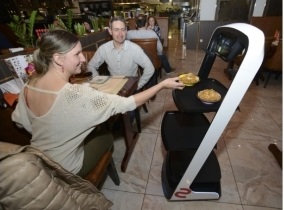China stays ahead of foreign countries in the development of indoor delivery robots. Outdoor autonomous delivery vehicles on the other hand are produced in small quantities in China and have not taken on a sizable scale yet, according to a report by ReseachandMarkets.
Indoor
Up to date, indoor autonomous delivery robots have been available in restaurants, hotels, office buildings, hospitals, Internet cafes, KTVs, and shopping malls, and have been vigorously promoted amid “contactless” services for the prevention and control of the COVID-19 pandemic. 2020 saw faster deployment and the operation of intelligent equipment such as indoor autonomous delivery robots. For instance, many catering companies such as Country Garden Robot Restaurant, Haidilao, De Zhuang, Xiabu Xiabu, Dadong, Hong Kong Maxim’s, etc. have begun to use autonomous delivery robots to serve dishes in their stores to save labor costs and improve the security of meals.
Comparatively, China stays ahead of foreign countries in the development of indoor delivery robots, where emerging players represented by Pudu Technology, Keenon Robotics, Excelland AI, YOGO, etc. have already offered basic products and been aggressively branching out into the multiple-scenario market alongside ceaseless iteration and speedy implementation of their technologies.
Outdoor
Against the huge market demand for instant delivery and express delivery as well as the decline in the labor force in China, major companies are enthusiastically deploying autonomous delivery vehicles. Besides start-ups like Neolix, IdriverPlus and White Rhino, e-commerce and logistics companies such as JD.com, Meituan, Cainiao, Suning and China Post are also sparing no efforts in developing their outdoor autonomous delivery business. Autonomous delivery vehicles are produced in small quantities in China and have not taken on a sizable scale yet, as is revealed by the companies concerned.
Constrained by imperfect policies and regulations, technology and scenario configurations, outdoor autonomous delivery vehicles are still undergoing pilot operation. Yet the industry gained momentum in 2020, with operations broadening from “single vehicle pilot run” to “closed scenarios/fixed route fleet operation”, and even to “city autonomous delivery operation”.
Logistics
E-commerce logistics companies thus deploy outdoor autonomous delivery vehicles in three ways: (i) to develop independently or partner with start-ups for deployment through logistics channels, for example, Alibaba self-develops the Xiaomanlv autonomous robot and deploys it though Cainiao logistics distribution; (ii) to work with governments, for example, Meituan and the People’s Government of Shunyi District, Beijing cooperated to deploy in the area; (iii) to join hands with market players like retailers and supermarkets, for example, White Rhino Auto (Beijing) Technologies Co., Ltd. together with Yonghui Superstores introduced retail autonomous delivery.

